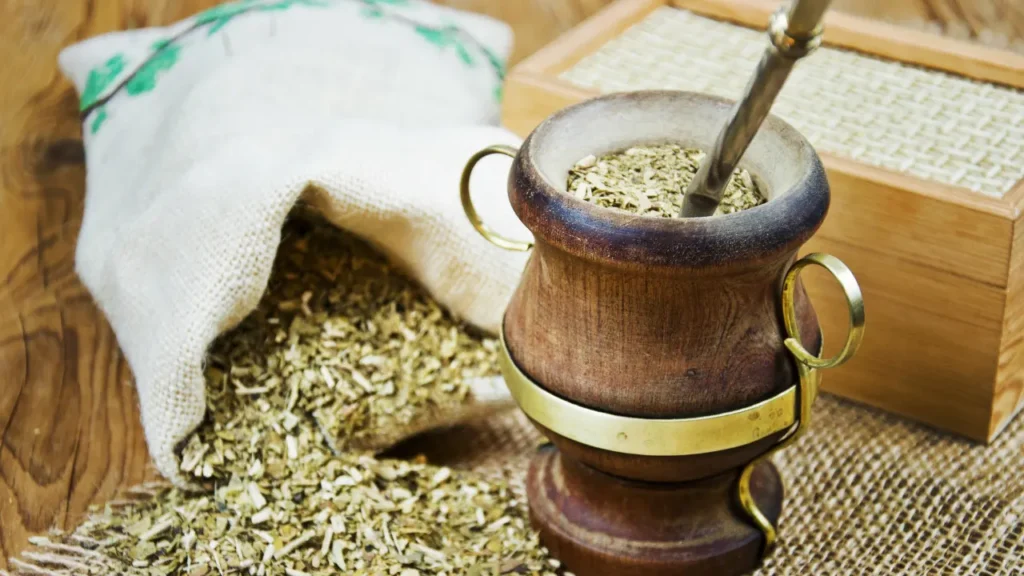The Yerba Mate plant, also known as Ilex paraguariensis, produces the leaves used to make the traditional South American beverage Yerba Mate. It is a well-liked beverage in several nations, including Argentina, Brazil, Paraguay, and Uruguay, and it is becoming more well-liked elsewhere in the world due to its conceivable health advantages and nootropic characteristics. The nature of Yerba Mate, its health advantages, the best dosage, adverse effects, possible drug interactions, and responsible use for improving alertness, focus, and cognition will all be covered in this article.
You May Also Like:
CBD for Concentration: The Productivity Hack for Energy and Focus
Sweet Orange: Benefits, Dosage, Side Effects, Drug Interactions, and Other Important Information
Yerba Mate: Benefits, Dosage, Side Effects, Drug Interactions, And Other Important Information is an original (NootropicsPlanet) article.
Nature of Yerba Mate
Caffeine, theophylline, and theobromine are among the diverse mixtures of substances found in Yerba Mate, including flavonoids, saponins, and other polyphenols. Although Yerba Mate contains caffeine, it has a lower stimulating impact than coffee since theobromine and theophylline are also present. The antioxidant properties of the flavonoids and other polyphenols in Yerba Mate help defend the body against oxidative stress and inflammation.
Health Benefits of Yerba Mate
Numerous health advantages of Yerba Mate have been reported, including enhanced mental focus, cognition, and alertness. Additionally, it has been demonstrated to possess anti-inflammatory and antioxidant qualities, which may aid in preventing chronic diseases like diabetes, cardiovascular disease, and cancer.
According to one study on older adults, consumption of Yerba Mate has been linked to improved cognitive function, particularly in the domains of attention and working memory. Due to its antioxidant and anti-inflammatory qualities, Yerba Mate consumption was linked to a lower incidence of type 2 diabetes and metabolic syndrome, according to another study. Yerba Mate has also been demonstrated to have a favorable impact on cardiovascular health by lowering blood pressure and enhancing lipid profiles.

Chemistry of Yerba Mate
Yerba Mate is a potent blend of flavonoids, saponins, other polyphenols, and phytochemicals including caffeine, theobromine, and theophylline. The concentrations of these chemicals can change depending on how they are prepared and where the plant is from.
A well-known stimulant, caffeine blocks the activity of adenosine, a neurotransmitter that encourages sleep and reduces arousal, in the central nervous system. Theobromine, a related substance in chocolate, has a comparable but less potent impact on the CNS. Tea contains a chemical called theophylline, which relaxes the smooth muscles in the airways and is used to treat respiratory diseases, including asthma.
Plants are abundant in polyphenolic chemicals known as flavonoids, which have anti-inflammatory and antioxidant activities. Saponins are glycosides linked to several health advantages, such as reducing cholesterol and increasing the immune system.
Physiological Mechanisms of Action
Numerous physiological systems, including the circulatory, digestive, and central nervous systems, have been proven to be impacted by Yerba Mate. Caffeine and other phytochemicals are present, which is why it has those effects.
It has been demonstrated that caffeine enhances cognitive abilities such as focus, attentiveness, and reaction time. It accomplishes this by inhibiting adenosine, often encouraging sleep and decreasing arousal. Dopamine and other neurotransmitters are released more readily when caffeine is consumed, elevating mood and enhancing drive.
According to Gonzalez de Mejia and Ramirez-Mares (2014), the flavonoids and other polyphenols in Yerba Mate have been linked to antioxidant and anti-inflammatory properties that may aid in preventing chronic diseases like cancer, cardiovascular disease, and neurological diseases.
The cardiovascular effects of Yerba Mate have also been demonstrated, including vasodilation and blood pressure-reducing effects. Theophylline, which relaxes blood vessels’ smooth muscles and lowers blood flow resistance, may be to blame for this.
Yerba Mate has been demonstrated to affect the digestive, central nervous, and cardiovascular systems. It has a long history of use as a digestive aid, and studies have shown that it reduces inflammation in the gut. Additionally, research on Yerba Mate has demonstrated antibacterial properties against some infections, including H. pylori, which can result in stomach ulcers.
Overall, the complex variety of phytochemicals found in Yerba Mate probably causes its physiological effects. Because of its effects on the circulatory, digestive, and central neurological systems, it is a viable candidate for further investigation as a potential nootropic supplement.

Optimal Dosage of Yerba Mate
Different Yerba Mate dosages are best, depending on the person and the desired impact. Caffeine levels in Yerba Mate, which are comparable to those in coffee, can range from 30 to 50 mg per gramme of dried leaf. Theophylline and theobromine, however, can offer Yerba Mate a less stimulating impact. Yerba Mate can be steeped in hot water to make tea, and a normal serving size is about 30 grams of dry leaves.
Caffeine use should be restricted to no more than 400 mg daily, around four cups of coffee or ten cups of Yerba Mate tea. Anxiety, sleeplessness, and digestive problems are some of the adverse effects that can result from excessive caffeine consumption.
Side Effects of Yerba Mate
Although Yerba Mate is generally regarded as harmless, it can have some potential adverse effects, especially when ingested in excessive quantities. The most typical Yerba Mate side effects are anxiety, sleeplessness, and digestive problems like diarrhea and upset stomach. These negative effects are frequently linked to Yerba Mate’s caffeine level.
Additionally, consuming Yerba Mate frequently and heavily has been linked to a higher risk of bladder, esophageal, and oral cancer, potentially as a result of the presence of carcinogenic polycyclic aromatic hydrocarbons (PAHs). However, how Yerba Mate is prepared and consumed significantly impacts this risk. Compared to more contemporary preparation techniques, including tea bags, traditional preparation techniques like gourd and bombilla can produce a higher concentration of PAHs.

Potential Substance Interactions with Yerba Mate
Yerba Mate may interfere with some prescription drugs and dietary supplements. Before ingesting Yerba Mate, it is advised that people who are using prescription drugs or dietary supplements speak with their doctor.
Caffeine, which is present in Yerba Mate, may interact with some drugs, including those for anxiety, depression, and heart problems. Supplements containing caffeine or other stimulants, such as guarana, may also interact with it.
Best Responsible Uses of Yerba Mate
To use Yerba Mate responsibly, it is recommended to consume it in moderation and to be aware of potential side effects and interactions with other substances. It is also essential to consider the method of preparation and consumption, as traditional methods can increase the risk of exposure to carcinogenic compounds.
Yerba Mate:
Conclusion
Yerba Mate represents a valuable herbal beverage with potential applications in promoting antioxidant activity, energy and alertness, weight management, digestive health, and cardiovascular health. Both traditional use and modern scientific research support its possible health benefits. While Yerba Mate offers promising health benefits, it’s essential to consume it in moderation, as excessive intake may lead to side effects such as insomnia, anxiety, and digestive upset. Additionally, individuals with certain health conditions or sensitivities to caffeine should consult with a healthcare professional before incorporating Yerba Mate into their routine. As interest in natural remedies and functional foods continues to grow, Yerba Mate offers a flavorful and invigorating option for those seeking to enhance their overall health and well-being.

References:
- Yerba Mate Tea (Ilex paraguariensis): A Comprehensive Review on Chemistry, Health Implications, and Technological Considerations. . Link: https://onlinelibrary.wiley.com/doi/abs/10.1111/j.1750-3841.2007.00535.x
- Impact of caffeine and coffee on our health. Link: https://www.sciencedirect.com/science/article/abs/pii/S1043276014001283
- Antithrombotic Effect of Chikusetsusaponin IVa Isolated from Ilex paraguariensis (Maté). Link: https://www.researchgate.net/publication/233327559_Antithrombotic_Effect_of_Chikusetsusaponin_IVa_Isolated_from_Ilex_paraguariensis_Mate
- The Effects of Mate Tea (Ilex paraguariensis) on Metabolic and Inflammatory Parameters in High-fat Diet-fed Wistar Rats. Link: https://pubmed.ncbi.nlm.nih.gov/23317109/
Important Note: The information contained in this article is for general informational purposes only, and should not be construed as health or medical advice, nor is it intended to diagnose, prevent, treat, or cure any disease or health condition. Before embarking on any diet, fitness regimen, or program of nutritional supplementation, it is advisable to consult your healthcare professional in order to determine its safety and probable efficacy in terms of your individual state of health.
Regarding Nutritional Supplements Or Other Non-Prescription Health Products: If any nutritional supplements or other non-prescription health products are mentioned in the foregoing article, any claims or statements made about them have not been evaluated by the U.S. Food and Drug Administration, and such nutritional supplements or other health products are not intended to diagnose, treat, cure, or prevent any disease.


